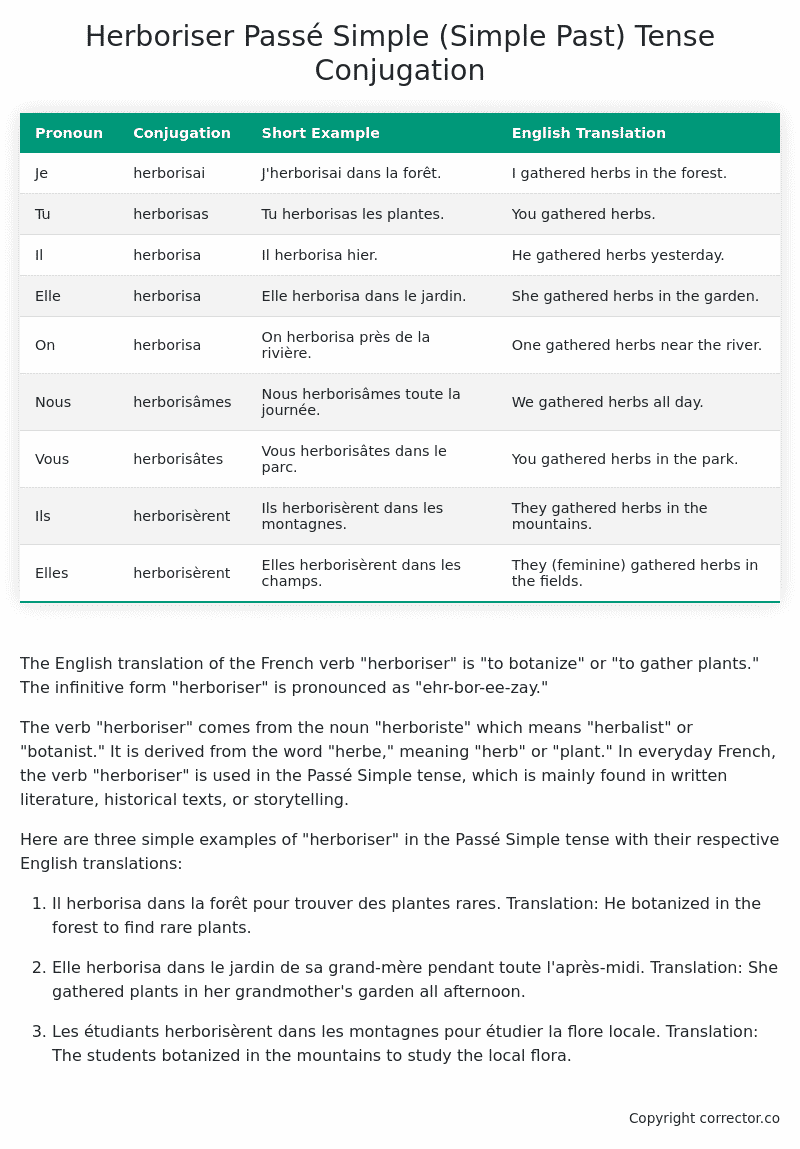Passé Simple (Simple Past) Tense Conjugation of the French Verb herboriser
Introduction to the verb herboriser
The English translation of the French verb “herboriser” is “to botanize” or “to gather plants.” The infinitive form “herboriser” is pronounced as “ehr-bor-ee-zay.”
The verb “herboriser” comes from the noun “herboriste” which means “herbalist” or “botanist.” It is derived from the word “herbe,” meaning “herb” or “plant.” In everyday French, the verb “herboriser” is used in the Passé Simple tense, which is mainly found in written literature, historical texts, or storytelling.
Here are three simple examples of “herboriser” in the Passé Simple tense with their respective English translations:
-
Il herborisa dans la forêt pour trouver des plantes rares.
Translation: He botanized in the forest to find rare plants. -
Elle herborisa dans le jardin de sa grand-mère pendant toute l’après-midi.
Translation: She gathered plants in her grandmother’s garden all afternoon. -
Les étudiants herborisèrent dans les montagnes pour étudier la flore locale.
Translation: The students botanized in the mountains to study the local flora.
Table of the Passé Simple (Simple Past) Tense Conjugation of herboriser
| Pronoun | Conjugation | Short Example | English Translation |
|---|---|---|---|
| Je | herborisai | J’herborisai dans la forêt. | I gathered herbs in the forest. |
| Tu | herborisas | Tu herborisas les plantes. | You gathered herbs. |
| Il | herborisa | Il herborisa hier. | He gathered herbs yesterday. |
| Elle | herborisa | Elle herborisa dans le jardin. | She gathered herbs in the garden. |
| On | herborisa | On herborisa près de la rivière. | One gathered herbs near the river. |
| Nous | herborisâmes | Nous herborisâmes toute la journée. | We gathered herbs all day. |
| Vous | herborisâtes | Vous herborisâtes dans le parc. | You gathered herbs in the park. |
| Ils | herborisèrent | Ils herborisèrent dans les montagnes. | They gathered herbs in the mountains. |
| Elles | herborisèrent | Elles herborisèrent dans les champs. | They (feminine) gathered herbs in the fields. |
Other Conjugations for Herboriser.
Le Present (Present Tense) Conjugation of the French Verb herboriser
Imparfait (Imperfect) Tense Conjugation of the French Verb herboriser
Passé Simple (Simple Past) Tense Conjugation of the French Verb herboriser (You’re reading it right now!)
Passé Composé (Present Perfect) Tense Conjugation of the French Verb herboriser
Futur Simple (Simple Future) Tense Conjugation of the French Verb herboriser
Futur Proche (Near Future) Tense Conjugation of the French Verb herboriser
Plus-que-parfait (Pluperfect) Tense Conjugation of the French Verb herboriser
Passé Antérieur (Past Anterior) Tense Conjugation of the French Verb herboriser
Futur Antérieur (Future Anterior) Tense Conjugation of the French Verb herboriser
Subjonctif Présent (Subjunctive Present) Tense Conjugation of the French Verb herboriser
Subjonctif Passé (Subjunctive Past) Tense Conjugation of the French Verb herboriser
Subjonctif Imparfait (Subjunctive Imperfect) Tense Conjugation of the French Verb herboriser
Subjonctif Plus-que-parfait (Subjunctive Pluperfect) Tense Conjugation of the French Verb herboriser
Conditionnel Présent (Conditional Present) Tense Conjugation of the French Verb herboriser
Conditionnel Passé (Conditional Past) Tense Conjugation of the French Verb herboriser
Conditionnel Passé II (Conditional Past II) Tense Conjugation of the French Verb herboriser
L’impératif Présent (Imperative Present) Tense Conjugation of the French Verb herboriser
L’impératif Passé (Imperative Past) Tense Conjugation of the French Verb herboriser
L’infinitif Présent (Infinitive Present) Tense Conjugation of the French Verb herboriser
L’infinitif Passé (Infinitive Past) Tense Conjugation of the French Verb herboriser
Le Participe Présent (Present Participle) Tense Conjugation of the French Verb herboriser
Le Participe Passé (Past Participle) Tense Conjugation of the French Verb herboriser
Struggling with French verbs or the language in general? Why not use our free French Grammar Checker – no registration required!
Get a FREE Download Study Sheet of this Conjugation 🔥
Simply right click the image below, click “save image” and get your free reference for the herboriser Passé Simple tense conjugation!

Herboriser – About the French Passé Simple (Simple Past) Tense
Formation
Usage
Narration
Historical Context
Interactions with other tenses
Passé Composé
Imparfait
Conditional and Subjunctive
Summary
I hope you enjoyed this article on the verb herboriser. Still in a learning mood? Check out another TOTALLY random French verb conjugation!


